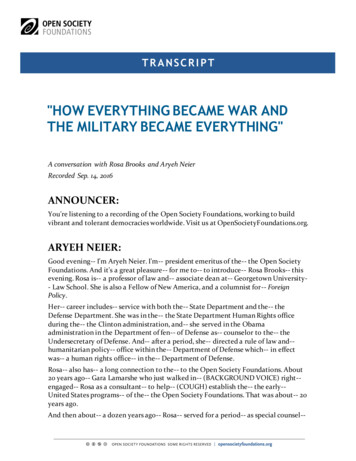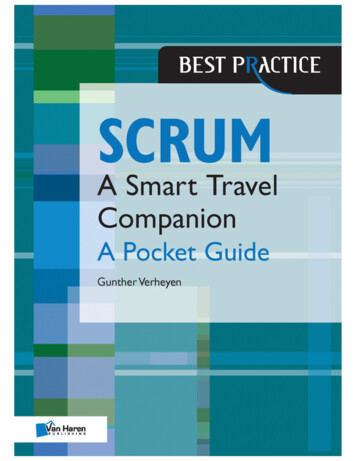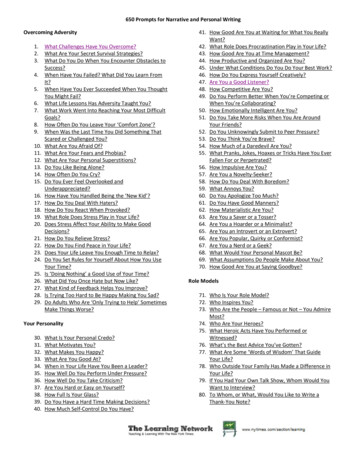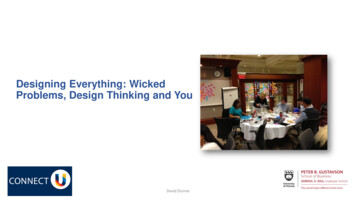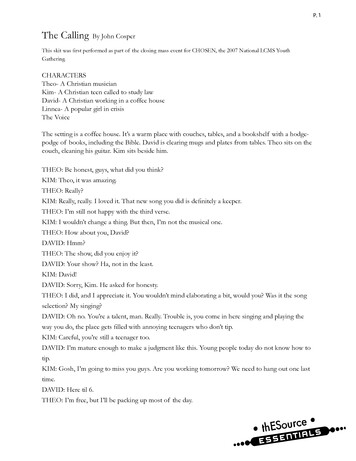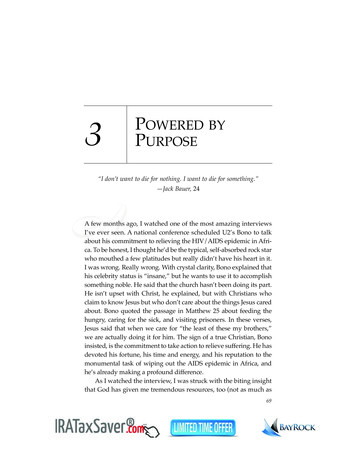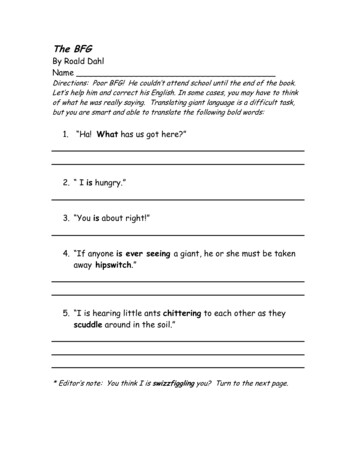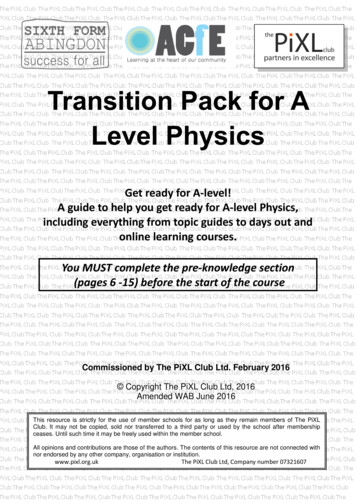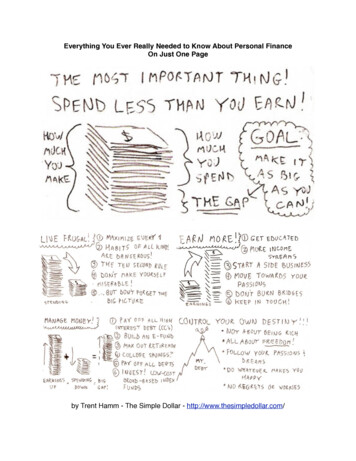
Transcription
Everything You Ever Really Needed to Know About Personal FinanceOn Just One Pageby Trent Hamm - The Simple Dollar - http://www.thesimpledollar.com/
IntroductionThe cover of this document tells you the whole story. Everything you really need toknow abut personal finance can be summarized in just one page. Spend less than youearn. Earn more. Live frugal. Do something sensible with the difference. Control yourown destiny. All of the other writing out there on personal finance is just details.In fact, the rest of this document is just details. What youʼll find in the rest of thisdocument is a lot of additional detail about the points made on the cover. Beyond that,this document is heavily footnoted. If youʼre reading this document on a computer, youcan click on those footnote numbers and immediately jump to online resources thatexpand upon that point.The hardest part of personal finance is just having the courage to take that first step.Sharing This DocumentThis document is being freely distributed under the Creative Commons Attribution-ShareAlike 3.0 United States License. What does that mean? It means that this document isfree - you can send it to your friends, put it up on your website, or print it out. You canalso use if for commercial purposes - if you want to format it as a book and sell it, feelfree. You can also modify the contents to your heartʼs desire as long as itʼs shared inthe same way - any derivative works must also be shared under the Creative CommonsAttribution-Share Alike 3.0 License.I only have two requests. One, if you write about this on your website, include a linkback to the original source of the document - http://www.thesimpledollar.com/onepage/.Doing this enables new readers to always be able to retrieve the latest version of thedocument. Two, if you do something interesting with this document (creating somethingnew and compelling with it, use it in a classroom, use it in a major media source),please let me know by dropping me an email at trent@thesimpledollar.com.All uncredited art was produced by me and is also shared under the Creative CommonsAttribution-Share Alike 3.0 United States License.Everything PFhttp://www.thesimpledollar.com2/49
My StoryI was born in raised in downstate rural Illinois. Growing up, my family didnʼt have a lotof money [1], but they did have a lot of love. They taught me the value of living frugally[2], but it wasnʼt always coupled with great financial lessons. In short, I had little ideahow to manage my own money, and when I left home for college, I made a longsequence of financial mistakes. [3]Flash forward to April 2006. I had a good job, was married, and had an infant son, but Istill hadnʼt learned the value of managing my money. To put it simply, I had a financialmeltdown [4], capped off by a long night of soul searching while facing a pile of bills thatI simply couldnʼt afford to pay [5].That experience woke me up. I dove into personal finance books, reading them by thehundreds [6]. I started throwing the book at our terrible financial state, trying everytactic that I read about. And it worked. Over the course of two years, we paid off twocar loans, five figuresʼ worth of credit card debt, five figuresʼ worth of student loan debt,and several personal loans. This turnaround laid the foundation for many things we hadonly dreamed about to that point - we bought a home, had another child, built a strongemergency fund, and, eventually, I was able to change careers and become a writer,taking a pay drop but living out a dream Iʼd had since I was a child.How did I do it? The cover of this document tells the truth of the matter. Itʼs theblueprint for all of these great changes in my life.Want to know more? Letʼs go.Everything PFhttp://www.thesimpledollar.com3/49
Idea #1: Spend Less Than You Earn!Annual income twenty pounds, annual expenditure nineteen nineteen and six,result happiness. Annual income twenty pounds, annual expenditure twentypounds ought and six, result misery.Charles Dickens, David CopperfieldIn the end, this is the fundamental rule of personal finance: spend less than you earn[7]. Itʼs the one point that comes up time and time again in almost every personalfinance book you read [8] or talk that you hear.Itʼs easy to see it when you look at each side of the coin. Letʼs say you earn 30,000 ayear and you spend 31,000 a year. That extra 1,000 has to be borrowed, often fromsources like credit cards. The following year, in order to maintain your lifestyle, you stillspend 1,000 a year more than you make, plus you spend 300 more than that justmaking the minimum payments on your debt, leaving you a total of 2,200 in the hole(the 1,000 extra you spent the first year plus the 1,000 extra you spent the secondyear plus the 300 extra you spent repaying that debt minus the 100 you actuallymanaged to pay off). The debt builds - after the third year, youʼre 3,600 in debt. ItEverything PFhttp://www.thesimpledollar.com4/49
keeps growing and growing and growing until that debt is eating up all of your income,leaving you in misery.On the other hand, letʼs say you only spend 29,000 a year - only 2,000 less inspending. That extra 1,000 goes into your savings account and earns 3%. The nextyear, you drop another 1,000 in the account and now you have 2,030 in there. Thenext year, another 1,000, bringing you to 3,060.90. That money builds up and soonyou have a house down payment or the seed money to start the small business of yourdreams - or even something as simple as the ability to easily pay for a car repair withoutyour heart skipping a beat.The difference between these two stories is only 2,000 a year. There are two avenuesto achieving this goal: spending less and earning more. By working on either (or both) ofthese areas, you can increase the gap between those two numbers - and that gap isyour ticket to freedom [9]. The harder you work on either spending less or earning more,the bigger that gap will become and the quicker that train to your dreams will arrive atthe station.Letʼs look at each side of that coin.Everything PFhttp://www.thesimpledollar.com5/49
Idea #2: Earn More!It's better to hang out with people better than you. Pick out associates whosebehavior is better than yours and you'll drift in that direction.Warren BuffettSo how does one earn more? Many people will argue that there is no universal way forpeople to earn more money, and theyʼre right: some people are born entrepreneurs,others function much better in an office environment. Some people are endlesslycreative, others are masters at completing long lists of tasks.Once you dig past that, though, there are some common things that anyone can do,regardless of their financial state, to earn more money.Get Started Now!The best way to get started is found in your own workplace.Everything PFhttp://www.thesimpledollar.com6/49
Go to work well-rested and presentable. Never show up to work looking like you justrolled out of bed. Take a shower, wear clean clothes, use deodorant, brush your teeth,and do your best to look presentable [10]. Also, get a good night of sleep before workso that you can be as mentally and physically fresh as possible. Every interaction youhave in the workplace will reflect either positively or negatively upon you, and you canvery easily increase the positive-ness of those interactions by just taking a half an hourto make yourself presentable.Minimize negative comments. Everywork environment provides ampleopportunities for negativity, whether itʼsjust workplace gossip or your manageris asking questions. While it might feelgood to participate in the negativity ofgossip, donʼt (feel free to listen, butdonʼt jump in with the negativity). Evenwhen supervisors are seekingcomments on other workers, hold backWomen workers in ordnance shops, Midval Steel and Ordnance Co.,Nicetown, Pa. Hand chipping with pneumatic hammers. 1918. Lt. Lubbe.on the negativity and look for whatCredit: National Archives and Records Administrationpositives you can find. Negativity in theworkplace drags everyone down and positivity lifts everyone, so stick with the positive.Donʼt “backstab” anyone. Along those same lines, youʼll have many opportunities to“sell out” others in the workplace. Avoid it at all costs. If you have an opportunity todiscuss other workers or particular situations, you might perceive that piling on thoseworkers or those situations will benefit you - rarely is that actually true. Instead, look forthe positives you can outline about anyone or anything.If you have downtime, find something useful to do. Many workplaces have timeswhere there is simply downtime - youʼre waiting on new customers, youʼve finished yourcurrent project, and so on. That downtime is key in separating the people who getahead from the people who get left behind. Find things to do with that time thatʼs useful.Clean up your workspace. Clean up the store. Work on a low-priority project. Improveyour skills. There are always things that can be done - donʼt just sit or stand around tobe told what to do.Everything PFhttp://www.thesimpledollar.com7/49
Do every task youʼre given as well as you can. When youʼre given a minor, menialtask, itʼs often very tempting to do it with minimal effort just to get it done. Youʼresupposed to sweep the floor, so you do it mindlessly and do a mediocre job. Youʼregiven something to type up, but you donʼt bother to check it for typos. Youʼre given amundane system administration task, so you overlook a basic step. Instead of fallinginto that trap, try to give your complete focus to the task at hand and do it as best youcan.Learn from (and emulate) the people who do their job well. In most workplaces, itʼseasy to identify the top workers. Theyʼre the ones that managers defer to and ask foradvice. Theyʼre the ones who always seem to come through with the things that need tobe done. As a result, they have job stability, plenty of options, and likely a very solidsalary. Learn from these people. Ask them plenty of questions about how they get thingsdone. Watch what they do, particularly with their downtime. In some situations, it mighteven be appropriate to ask them to be your mentor [11].Build positive relationships witheveryone in the workplace. You donothing but gain from building a positiverelationship with everyone in yourworkplace, from the highest level ofmanagement that you can easily interactwith to the person who empties the trashcans. Be friendly to everyone. Ask howtheir day is going. Find some commoninterests and talk about them. The morepeople you develop positive relationshipswith (both up and down the hierarchy),the better off youʼll be.Secretaries, housewives, women from all over central Florida are gettinginto vocational schools to learn war work. Typical are these in theDaytona Beach branch of the Volusia country vocational school. April1942. Credit: National Archives and Records AdministrationIgnore poisonous people. Every workplace seems to have a poisonous person or two.I know Iʼve interacted with plenty of such people in my years - and in a few cases,theyʼve really reduced the quality of the work environment and made me more negative.If youʼre stuck with a poisonous person, just minimize all interaction with that person.Everything PFhttp://www.thesimpledollar.com8/49
When you do have to interact, stick with the facts and get back to your own tasks. Thatperson might spew some poison about you, but most workplaces have pretty clearlyidentified the poisonous people and take what they say with a grain of salt, so donʼt lettheir responses or backstabbing bother you. Get your work done and move on with life.Never use your sick leave as “extra vacation.” In one environment where I worked,this problem was endemic. As soon as a person had enough sick leave built up to takeeven a single day off, that person called in “sick” like clockwork - with one exception.Want to guess who the one person was that received a raise and then, later, apromotion was? Itʼs fine to use your sick leave when youʼre actually ill, but consistentand reliable presence in the workplace is a huge benefit for your long-term career goals.Improve yourself in your spare time. The simplest way to do this is to work on gettingin better shape. Get some exercise [12] and eat a healthy diet [13]. Doing this willimprove both your energy and your appearance, things that are purely beneficial in anywork environment. If you have a job that requires some specific skills, find ways toimprove those in your spare time as well. Keep up to date on your specific area ofknowledge. Learn what you would need to know to take the next step in your career.Step up to challenges when they present themselves. When a challenging situationcomes up, donʼt shy away from it. Step up to the plate and give it your best shot. If youthink it might be over your head, ask for help when you need it. If you show yourselfable to handle challenging tasks, youʼll become a more valuable employee, and a morevaluable employee gets more perks.Be a leader when itʼs needed. When difficult situations occur, every workplace benefitsfrom having someone they can rely on as a leader. Be the person that speaks for theworkers during a meeting. Be the person who helps people out when theyʼre goingthrough a crisis. Eventually, youʼll find that people simply come to you by default - andthat includes management.Own up to your own mistakes. If you mess up (and you inevitably will), admit to themistake and do what you can to rectify it. Donʼt try to hide it. Donʼt try to pass the blameto others. Apologize well - not facetiously [14]. Everyone makes mistakes. The winnersEverything PFhttp://www.thesimpledollar.com9/49
are the people who own up to those mistakes and then go the extra mile to fix thecreated problem.Stand up for yourself when you want a raise or promotion. If you want a raise or apromotion, be clear about it. Ask your supervisor directly for what you want - and beable to make a good case for it. If you get a “no,” ask what you need to do to putyourself in position for it and do just that. If you donʼt stand up for yourself, no one will.Get EducatedThis doesnʼt mean drop out and go back to school. Itmerely means to keep learning new things. If somethinginterests you, read a book about it [15]. Take eveningclasses to get certification in a certain area or get amastersʼ degree. No matter what youʼre doing, thereʼssome way you can learn more and improve yourself.Develop More Income StreamsAlways be on the lookout for ways to have money rollinginto your pocket from a lot of different places [16]. Maybeyouʼre a good writer and can sell a short story or an onlineebook. Maybe youʼve got a little piece of land somewherethat you can lease to a farmer or a developer. Maybe youspend your free time managing a flower bed in the park -Power house mechanic working on a steampump. By Lewis Hine, 1920. Credit:National Archives and RecordsAdministrationwhy not put a little wooden freewill donation box out therefor people to drop a coin in? Maybe you have some extracash laying around with which you can buy a long-term treasury note that will keepissuing you a check every six months [17]. Having more income streams merely meansthat losing one of them (like your job) is less devastating in your life and it also meansyour overall income for now will go up.Start a Side BusinessInstead of burning a few hours in front of the television each evening [18], how aboutinvesting at least part of that time into starting a side business [19]? You can try startinga blog with a few ads on it, or maybe youʼre good with woodworking and can make deckfurniture. Maybe youʼre good at baking bread and can take loaves to the farmerʼsEverything PFhttp://www.thesimpledollar.com10/49
market, or maybe you deeply enjoy gardening and can sell vegetables. There are lots ofpossibilities out there for starting a business that will supplement your current incomeand perhaps eventually grow into your main income [20].Move Towards Your PassionsWhenever the opportunity presents itself, gravitate towards the things that really exciteyou, because passion is what will make you successful [21]. For me, my passion iswriting, so Iʼve made an effort to gravitate towards it by working on The Simple Dollar inmy spare time. For others, it could be anything - maybe itʼs leading a team, or perhapsitʼs writing beautiful computer code. Whatever really excites you and makes you want todo more and more and more and better and better and better, thatʼs what you need tomove towards at all times [22].Donʼt Burn BridgesYou never know when a relationship youʼve forged in your past might come in handylater on, even the ones you completely donʼt expect. Thus, even if you feel wronged in asituation or want “revenge” on some people - or even if you just feel an urge to spreadnegative gossip - resist it. As you get older, youʼll find yourself time and time againbumping into people that you forged relationships with earlier on - if you burned thosebridges, youʼll find that eventually youʼll have burnt that very bridge that you need tocross to get ahead. My advice? Never spread a negative word about anyone, because itnever helps.Keep in TouchWhen you do build a bridge with someone, donʼt let it get old and worn out - spend thetime to keep in touch with that person. Shoot them an email or a phone call every oncein a while just to see what theyʼre up to. When itʼs clear they need help and you caneasily provide it, always provide it. I found the book Never Eat Alone by Keith Ferrazzi[23] to be particularly powerful in this regard. Iʼm rather introverted, and itʼs often achallenge for me to initiate and then keep communication going with someone, and thisbook provided tons of tips on how (and why) to keep contact with people.Everything PFhttp://www.thesimpledollar.com11/49
Idea #3: Live Frugal!Industry, perseverance, and frugality make fortune yield.Benjamin FranklinFor a lot of people, frugality is a nine letter word for cheap. They think of people doingstuff like buying cartloads of generic products, using forty coupons in the checkout aisle,wearing patched clothing, driving a rusted-out old vehicle, and other such things that itʼseasy to look down your nose at.Hereʼs a secret, something that Iʼve witnessed several times in my own life and readabout many more: those frugal people that you look down your nose at often have amountain of cash in the bank (not always, of course, but more often than you think).Theyʼre not drowning in a mortgage, theyʼre not making payments on a five figure creditcard debt. Theyʼre not working to death on the weekends or drowning an ulcer in PeptoBismol. Theyʼre living their life according to their own rules.Everything PFhttp://www.thesimpledollar.com12/49
The best part is that we can all apply some of those same rules in our own life. Hereʼswhat you can do to start reducing that spending.Maximize Every DollarEvery time you spend money, you make a decision. You decide that whatever youʼregiving that dollar for is worth it, and thus you make the exchange. The real key tospending less is to raise that definition of what a dollar is worth.Here are 100 great tactics for reducing your spending and saving more money.1. Switch your bank accounts to a bank that respects you. You shouldnʼt bespending your hard-earned money on maintenance fees - you also should be earningsome serious interest on your checking and savings accounts. I use ING Direct as myprimary bank - I earn roughly 1% on my checking account and 1.4% on my savingsaccount (even in this down economy) and theyʼve never dinged me with a fee. Itʼs nottoo hard to switch banks, either, if you sit down and just do it. [23]2. Turn off the television. One big way to savemoney is to watch less television. There are a lot offinancial benefits to this [24]: less exposure to guiltinducing ads, more time to focus on other things inlife, less electrical use, and so on. Itʼs great tounwind in the evening, but seek another hobby to dothat.3. Turn a critical eye to your “collections.” Mostpeople collect something - what do you collect? Is itsomething that consistently brings you joy? Or is itsomething that you just do out of habit at this point? Does the collection itself havevalue? Could you perhaps “trim the fat” from this collection by getting rid of duplicates orgetting rid of the items you no longer use [25]? Also, could you perhaps cut down onyour spending on that hobby [26], [27]? Focus on trimming the things you donʼt feelstrongly about - if you dig into things that bother you, youʼre going to eventually relapse.Everything PFhttp://www.thesimpledollar.com13/49
4. Sign up for every free customer rewards program you can. Even if you rarelyshop at that place, having a rewards card for that place will eventually net you somecoupons and discounts. Hereʼs the basic game plan for maximizing these programs[28]: create a Gmail address just for these mailings, collect every card you can, andthen check that account for extra coupons whenever youʼre ready to shop.5. Make your own gifts instead of buying stuff from the store. You can make foodmixes, candles, bread, cookies, soap, and all kinds of other things at home quite easilyand inexpensively [29]. These make spectacular gifts for others because they involveyour homemade touch, plus quite often theyʼre consumable, meaning they donʼt wind upfilling someoneʼs closet with junk. Even better - include a personal handwritten note withthe gift [30]. This will make it even more special than anything you could possibly buydown at the mall, plus it saves you money.6. Master the thirty day rule. Whenever youʼre considering making an unnecessarypurchase, wait thirty days and then ask yourself if you still want that item [31]. Quiteoften, youʼll find that the urge to buy has passed and youʼll have saved yourself somemoney by simply waiting. If you want, you can even keep a “thirty day list” where youwrite down the item and the day youʼll reconsider it, but I prefer just to keep this one inmy head - that way, I often just forget about the unimportant things.7. Write a list before you go shopping and stick to it. One should never go into astore without a strong idea of what one willbe buying while in there [32]. Make acareful plan of what youʼll buy before yougo, then stick strictly to that list when yougo to the store. Donʼt put anything in thecart thatʼs not on the list, no matter howtempting, and youʼll come out of the storesaving a bundle.A peek at my coupon binder - an effective way to use coupons.[33]8. Invite friends over instead of going out. Almost every activity at home is lessexpensive than going out. Invite some friends over and have a cookout or a potluckEverything PFhttp://www.thesimpledollar.com14/49
meal, then play some cards and have a few drinks. Everyone will have fun, the cost willbe low, and the others will likely reciprocate not long afterwards.9. Instead of throwing out some damaged clothing, repair it instead. Donʼt toss outa shirt because of a broken button - sew a new one on with some closely-matchedthread. Donʼt toss out pants because of a hole in them - put in a patch of some sort andsave them for times when youʼre working around the house. Simple sewing can be doneby anyone - it just takes a few minutes and it saves a lot of money by keeping you frombuying new clothes when you donʼt really need to.10. Donʼt spend big money entertaining your children. Most children, especiallyyoung ones, can be entertained very cheaply. Buy them an end roll of newspaper fromyour local paper [34] and let their creativity run wild. Make a game out of ordinary stuffaround the house, like tossing pennies into a jar, even. Collect common householditems into a “rainy day” art box [35]. Realize that what your children want most of all isyour time, not your stuff, and youʼll find money in your pocket and joy in your heart.11. Call your credit card company and ask for a rate reduction. Take any of yourcredit cards that are carrying a balance, flip them over, and call the number on the back.Tell them that you want an interest rate reduction or youʼll take your businesselsewhere. If the first person you talk to wonʼt do it, ask to talk to a supervisor [36]. Ifyou have a 5,000 balance, even a 3% rate reduction saves you 150 a year.12. Clean out your closet. Go through your closets and try to get rid of some of thestuff in there. You can have a yard sale with it, take it to a consignment shop, or evendonate it for the tax deduction - all of which turn old stuff you donʼt want to use any moreinto money in your pocket. Not only that, itʼs often a psychological load off your mind toclean out your closets.13. Buy games that have a lot of replay value - and donʼt acquire new ones untilyouʼve mastered what you have. My video game buying habits [37] have changedquite a bit since my “game of the week” days. Now, I focus on games that can be playedover and over and over again, and I focus on mastering the games that I buy. Goodtargets include puzzle games and long, involved quest games - they maximize the valueof your gaming dollar.Everything PFhttp://www.thesimpledollar.com15/49
14. Drink more water. Not only does drinking plenty of water have great healthbenefits, water drinking has financial benefits, too [38]. Drink a big glass of water beforeeach meal, and not only will you digest it better, you wonʼt eat as much, saving on the olʼfood bill. Youʼll also find yourself feeling a bit better as you begin to get adequatelyhydrated (most Americans are perpetually somewhat dehydrated).15. Cut back on the conveniencefoods - fast foods, microwavemeals, and so on. Instead of eatingfast food or just nuking someprepackaged food when you gethome, try making some simple andhealthy replacements that you cantake with you [39], like homemadebulk breakfast burritos [40]. Anhourʼs worth of preparation oneweekend can give you a ton ofcheap and handy meals that will endup saving you a lot of cash and not eat into your time when youʼre busy.16. Give up expensive habits, like cigarettes, alcohol, and drugs. Those habitscause money to flow away from you with nothing in return. Call up your fortitude andwork hard to kick the habits and youʼll find that money staying in your pocket instead ofburning up and floating away.17. Make a quadruple batch of a casserole. Casseroles are nice, easy dishes toprepare, but on busy nights, itʼs often still easier to just order some take-out or eat out orjust plop a prepackaged meal in the oven. Instead, the next time you make a casserole,make four batches of it and put the other three in the freezer [41]. Then, the next timeyou need a quick meal for the family, grab one of those batches and just heat it up easy as can be. Even better, doing this allows you to buy the ingredients in bulk, makingeach casserole cheaper than it would be ordinarily - and far, far cheaper than eating outor trying a prepackaged meal.Everything PFhttp://www.thesimpledollar.com16/49
18. Be diligent about turning off lights before you leave. If you spend one minuteturning off lights before a two hour trip, thatʼs the equivalent of earning 50 an hour [42].Thatʼs some impressive savings, particularly if you do it before longer trips. The key is touse less energy, particularly when youʼre not using the device.19. Swap books, music, and DVDs cheaply on the internet via services likePaperBackSwap. You can very easily swap the books and CDs and DVDs youʼvegrown bored with via the internet with others. Just use sites like PaperBackSwap [43],clean out your media collection, and trade them with others online. The best part? Youʼllget a flood of new books (or CDs or DVDs [44]) to enjoy, mailed right to you - for free.20. Maximize yard sales. I like to stop by yard sales if I see them, but I recognize thatoften the stuff there is junk. Thus, Iʼm careful about what I buy and I use clever tactics tofind it - and lower the prices [45]. That way, I wind up with a really big bargain - or else Ican just walk away with the money in my pocket, having been entertained for a bit.21. Install CFL (or, even better, LED)bulbs wherever it makes sense. Thesebulbs might cost more initially, but theyboth have a longer life than normalincandescent bulbs and they both eat farless electricity. CFLs tend to use about25% of the electricity of an incandescent- LEDs use about 20% [46]. CFLs arecheaper than LEDs right now andproduce better light, but not quite asgood as incandescent bulbs. My policy? Put LEDs in closets and out of the way places,use CFLs for hall and some room lighting, and use incandescent bulbs (until the otherbulbs get better) where you read and do other eye-intensive activities. This will trim asignificant amount from your electric bill.22. Install a programmable thermostat. These devices regulate the temperature inyour house automatically according to the schedule that you set. Thus, when youʼre nothome, it allows the heating or cooling to turn off for several hours, saving you on yourEverything PFhttp://www.thesimpledollar.com17/49
energy bill. A programmable thermostat can easily cut your energy bill by 10 to 20% and itʼs surprisingly easy to install [47].23. Buy appliances based on reliability, not whatʼs cheapest at the store. Itʼs worththe time to do a bit of research when you buy a new appliance. A reliable, energyefficient washer and dryer might cost you quite a bit now, but if it continually saves youenergy and lasts for fifteen years, youʼll save significant money in the long run [48].When you need to buy an appliance, research it - start with back issues of ConsumerReports at the library. An hourʼs worth of research can easily save you hundreds ofdollars.24. Clean your carʼs air filter. A clean air filter can improve your gas mileage by up to7%, saving you more than 100 for every 10,000 miles y
Everything You Ever Really Needed to Know About Personal Finance . free - you can send it to your friends, put it up on your website, or print it out. . if you want to format it as a book and sell it, feel free. You can also modify the contents to your heartʼs desire as long as itʼs shared in the same way - any derivative works must also .

